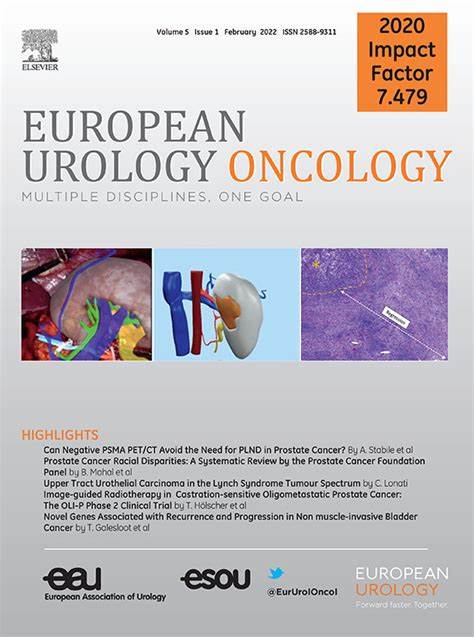关于前列腺癌男性患者接受多聚-ADP核糖聚合酶抑制剂+新型荷尔蒙疗法联合疗法后治疗突发不良事件处理的专家共识建议》。
IF 8.3
1区 医学
Q1 ONCOLOGY
引用次数: 0
摘要
背景和目的:最近的临床试验表明,采用聚-ADP核糖聚合酶(PARP)抑制剂(PARPi)和新型激素疗法(NHT)联合治疗转移性前列腺癌(mPC)的男性患者的无进展生存期有所改善。美国、加拿大、欧洲和日本的监管机构最近批准了这种治疗前列腺癌的联合疗法。常见的不良反应(AE)包括疲劳、恶心和呕吐以及贫血。目前还缺乏针对这些联合疗法的细致入微的不良反应管理指南。专家组的目标是就接受 PARPi + NHT 联合疗法治疗的 mPC 患者的 AE 管理达成专家共识:方法:采用兰德公司/加州大学洛杉矶分校改良德尔菲小组方法。AE采用《不良事件通用术语标准》进行定义。12 位专家(7 位肿瘤内科医生、1 位高级执业注册护士、3 位泌尿科医生和 1 位患者权益倡导者)查阅了相关文献;针对 419 种患者情况,以 1-9 分制独立评定了疑似导致不良事件的药物的初步不良事件处理方案;在 2023 年 3 月的一次会议上讨论了意见一致的领域 (AoAs) 和意见分歧的领域 (AoDs);并在会后重复了这些评定。第二轮评分构成了指南的基础:在第一轮和第二轮评级之间,分歧率从 41% 降至 21%,对每种 AE 至少有一种管理策略达成了一致。共识包括以下内容:(1) 对于轻度 AE 患者,继续对症治疗;(2) 对于中度疲劳,建议采用非药物治疗,暂时停止治疗,待症状缓解后减量重新开始治疗;(3) 对于严重恶心或任何程度的呕吐,对症治疗无效时,暂时停止治疗,待症状缓解后减量重新开始治疗;(4) 对于血红蛋白 7.1-8.0 g/dl 且出现贫血症状时,应暂时停止治疗,待输注红细胞后减量重新开始治疗:患者摘要:一个专家小组为接受聚-ADP核糖聚合酶抑制剂和新型激素疗法联合治疗的转移性前列腺癌患者制定了不良事件(AE)管理指南。对于轻度 AE,建议在对症治疗的同时继续进行癌症治疗。对于中度或重度不良反应,应暂时停止癌症治疗,待不良反应缓解后再以相同剂量或减少剂量重新开始治疗。本文章由计算机程序翻译,如有差异,请以英文原文为准。
Expert Consensus Recommendations on the Management of Treatment-emergent Adverse Events Among Men with Prostate Cancer Taking Poly-ADP Ribose Polymerase Inhibitor + Novel Hormonal Therapy Combination Therapy
Background and objective
Recent clinical trials have shown improvement in progression-free survival in men with metastatic prostate cancer (mPC) treated with combination poly-ADP ribose polymerase (PARP) inhibitors (PARPi) and novel hormonal therapy (NHT). Regulatory bodies in the USA, Canada, Europe, and Japan have recently approved this combination therapy for mPC. Common adverse events (AEs) include fatigue, nausea and vomiting, and anemia. Nuanced AE management guidance for these combinations is lacking. The panel objective was to develop expert consensus on AE management in patients with mPC treated with the combination PARPi + NHT.
Methods
The RAND/University of California Los Angeles modified Delphi Panel method was used. AEs were defined using the Common Terminology Criteria for Adverse Events. Twelve experts (seven medical oncologists, one advanced practice registered nurse, three urologists, and one patient advocate) reviewed the relevant literature; independently rated initial AE management options for the agent suspected of causing the AE for 419 patient scenarios on a 1–9 scale; discussed areas of agreement (AoAs) and disagreement (AoDs) at a March 2023 meeting; and repeated these ratings following the meeting. Second-round ratings formed the basis of guidelines.
Key findings and limitations
AoDs decreased from 41% to 21% between the first and second round ratings, with agreement on at least one management strategy for every AE. AoAs included the following: (1) continue therapy with symptomatic treatment for patients with mild AEs; (2) for moderate fatigue, recommend nonpharmacologic treatment, hold treatment temporarily, and restart at a reduced dose when symptoms resolve; (3) for severe nausea or any degree of vomiting where symptomatic treatment fails, hold treatment temporarily and restart at a reduced dose when symptoms resolve; and (4) for hemoglobin 7.1–8.0 g/dl and symptoms of anemia, hold treatment temporarily and restart at a reduced dose after red blood cell transfusion.
Conclusions and clinical implications
This expert guidance can support management of AEs in patients with mPC receiving combination PARPi + NHT therapy.
Patient summary
A panel of experts developed guidelines for adverse event (AE) management in patients with metastatic prostate cancer treated with a combination of poly-ADP ribose polymerase inhibitors and novel hormonal therapy. For mild AEs, continuation of cancer therapy along with symptomatic treatment is recommended. For moderate or severe AEs, cancer therapy should be stopped temporarily and restarted at the same or a reduced dose when AE resolves.
求助全文
通过发布文献求助,成功后即可免费获取论文全文。
去求助
来源期刊

European urology oncology
Multiple-
CiteScore
15.50
自引率
2.40%
发文量
128
审稿时长
20 days
期刊介绍:
Journal Name: European Urology Oncology
Affiliation: Official Journal of the European Association of Urology
Focus:
First official publication of the EAU fully devoted to the study of genitourinary malignancies
Aims to deliver high-quality research
Content:
Includes original articles, opinion piece editorials, and invited reviews
Covers clinical, basic, and translational research
Publication Frequency: Six times a year in electronic format
 求助内容:
求助内容: 应助结果提醒方式:
应助结果提醒方式:


